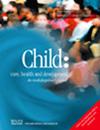‘I Did Not Know We Could Exercise This Small Premature Baby’: Challenges Experienced by Parents While Implementing Early Intervention for Their Preterm Infants—A Qualitative Perspective
Abstract
Background
Preterm birth is a highly stressful experience for both parents and infants. Parental participation in care enhances developmental outcomes, fosters parent–infant interactions and builds parental confidence. However, low parental adherence has always been a challenge in the successful implementation of intervention programs both in the NICU and at home. It is imperative to understand parents' perspectives and view the challenges that they experience through their lens while providing early intervention to their infants born preterm. This study is aimed at identifying new parents' challenges when implementing early intervention programs for their infants during the transition from hospital to home.
Methods
Ten parents of preterm infants trained to administer early intervention programs in the NICU and at home were recruited during their infants' 3-month follow-up. Semistructured in-depth interviews were conducted until data saturation. The audio recordings of the interviews were transcribed and translated into English. Thematic analysis, using ATLAS.ti Version 8.0 software, identified overarching challenges through deductive and inductive coding.
Results
Data analysis identified five recurring themes: (1) navigating early days of parenthood, (2) nurturing resilience in infant care, (3) supporting infants through informed caregiving, (4) maximizing efficiency in infant care through time mastery and (5) balancing equity and flexibility in caregiving. Parents expressed fear of handling their infants born preterm because of their low birth weight and small size. Time constraints, changing sleep patterns and daily routines make it difficult for mothers to adhere to exercise programs. Parents also face challenges when infants exhibit stressful behaviour. Furthermore, gender differences were observed, with fathers often not continuing the program at home.
Conclusions
The study highlights parents' main challenges when providing early intervention for infants born preterm at home. It emphasizes issues related to maternal roles, family support and difficulties in infant handling, exercise and time management.
Trial Registration
ClinicalTrials.gov identifier: CTRI/2020/09/027994.


 求助内容:
求助内容: 应助结果提醒方式:
应助结果提醒方式:


